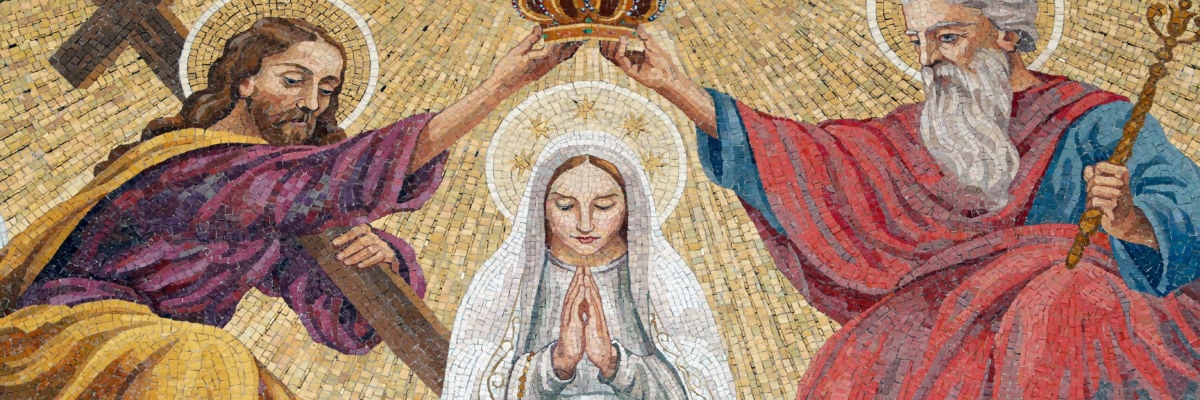
For much of my life, I struggled to trust in God’s love. I had a firm belief that God loved me because the Bible told me so, but I strove to feel an unshakable confidence in that love. Since my conversion to Catholicism, I have understood more of God’s tenderness, and often that experience comes through Mary. When Jesus shared his mother with us, he was gifting us someone gentle and attentive who would help us experience his love in the uniquely feminine way that infants and children do.
When I was Protestant and miscarried a baby, I felt deeply troubled that my baby wouldn’t have a mother. I knew that the child would be safe in the arms of my heavenly Father, but I couldn’t shake the nagging anxiety that all babies need their mother. Through my miscarriage last January, I turned to Mary and asked her to hold my baby. It was the only prayer I had energy to pray.
Later that week, a friend, who is a gifted artist but not at all Catholic, texted me a sketch she had drawn of me kneeling before Mary with my head in her lap while she cradled my baby. I was stunned. I asked my friend what made her draw it, and she said simply, “I don’t know. I just couldn’t get the image out of my head.” I knew that it was the tender reassurance of my mother, that she hadn’t ignored me and certainly wouldn’t neglect mothering my child.
When my husband and I decided to try conceiving again, I asked my rosary study group to appeal to Mary with me. As always, she answered with overwhelming kindness . . . and we conceived twins!
This Advent, I am heavily pregnant with those boys, and it gives me many opportunities to remember the tender sacrifices of Mary. Jesus gifted us his Mother because he knew that we would need her kindness in the trials of this life and that she would care for us the way she cared for him. Her suffering gives “courage to those whose burdens are heavier than their pleasures—to those who have children destined for death when they are hardly launched on the sea of life, to those who find their love’s surrender betrayed and even despised” (105). Mary, in her immaculate conception, was free to refuse, but instead she gave her fiat. She stood before the creator of the universe in complete purity and chose the path of sacrifice without pleasure because of her complete love for God. When we enter into Christ through baptism, we are adopted into that same depth of a mother’s love.
This reality is made tangible in the maternity reflected by the Church, where we receive the nurturing that a child requires from his mother. We come and are fed. We come to receive graces from the Holy Spirit and teaching from our spiritual fathers. All this is given to us through the image of a mother, in the same way the whole world received God through the motherhood of Mary.
Advent is a season of anticipation and quiet. Christ grew inside his mother in the most ordinary way, and it is through the ordinary that we see him in our own lives. We submit our joys and struggles to Christ the same way Mary submitted her life with Joseph to give him his humanity. Like Christ, we encounter our mother and her kindness most clearly when we settle patiently into the humility of the daily work that is required of us. Through our encounters with Mary, we learn to submit ourselves to the process of sanctification and become like Christ. Mary’s love changes us all into the image of her firstborn so that we can share in his inheritance of eternal life.
As we delve into Advent, I encourage you to look over your life and notice the kindnesses of Mary toward you. I found it in the pain and sorrow of miscarriage—something so common that almost every woman I know has also endured it. Your encounter may be different from mine, but it will almost certainly be found in the quiet, ordinary struggles of human life. There are likely many hidden moments of a mother’s love that are changing you into the image of her firstborn.
If we have truly given our humanity to be changed into Christ, it is essential to us that we do not disturb this time of growth. It is a time of darkness, of faith. We shall not see Christ’s radiance in our lives yet; it is still hidden in our darkness; nevertheless, we must believe that He is growing in our lives; we must believe it so firmly that we cannot help relating everything, literally everything, to this almost incredible reality. This attitude it is which makes every moment of every day and night a prayer (42).
When Jesus came to the end of his suffering, he looked and saw pain and confusion in his disciple. In love and compassion, he gifted us the one who stayed by his side and cared for him through his own struggles—the one who gave him his humanity even as he gives us our deity. “Behold, your mother.”



